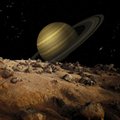
On Earth, microorganisms appear to inhabit all physical space that provides the minimum requirements for life. These include the availability of water, carbon, nutrients, and light or chemical energy. While these are generally abundant in surface or near-surface environments, their mode and distribution in the subsurface are poorly constrained. Nevertheless, it has now been shown unequivocally that archaea and bacteria inhabit deeply buried rocks and sediments where they contribute to biogeochemical cycles. All evidence suggests that these subsurface ecosystems are spatially enormous and diverse. On other planets, at least in our solar system, putative extant or extinct life would most likely reside underground or in massive ice shells. With a focus on near-by planets where landed missions are more than just a possibility, access to the subsurface will be highly desirable. Robust strategies for subsurface life detection on Mars, Europa, or other potential targets are poorly developed. The search for extant life or its biosignatures is scientifically and technologically extremely difficult; on Earth, it is a formidable but tractable challenge.
Our cross-disciplinary team from the University of Southern California, the California Institute of Technology, the Jet Propulsion Laboratory, the Rensselaer Polytechnic Institute, and the Desert Research Institute (DRI) will develop field, laboratory, and modeling approaches aimed at detecting and characterizing microbial life in the subsurface?the intraterrestrials.